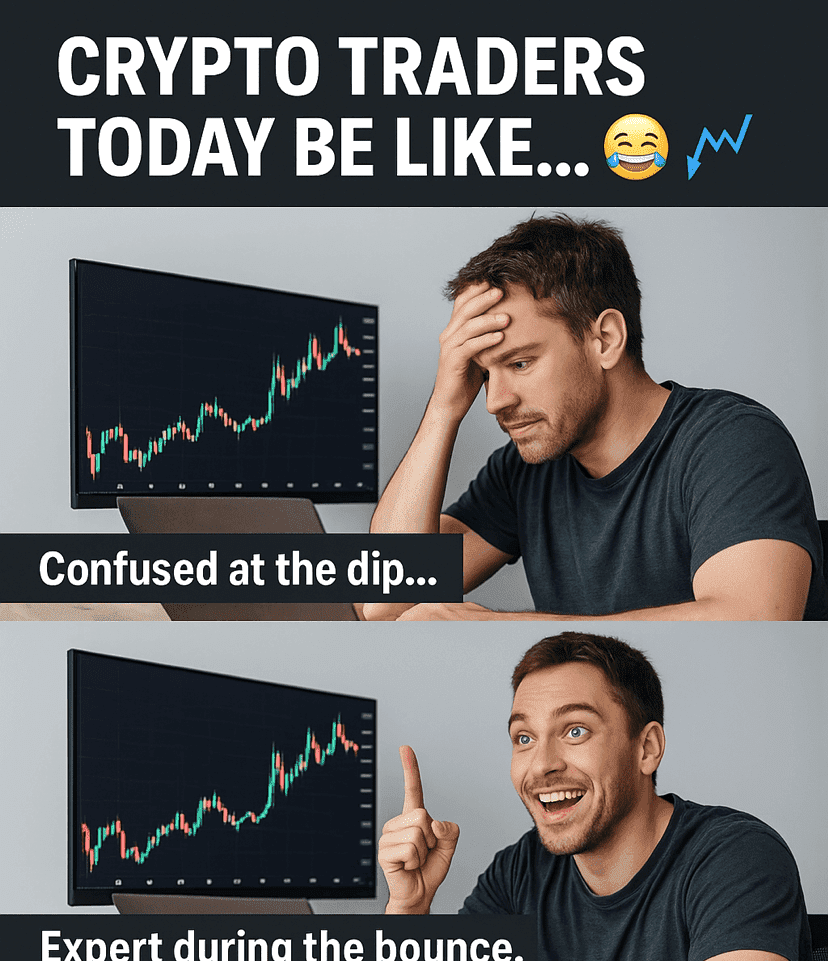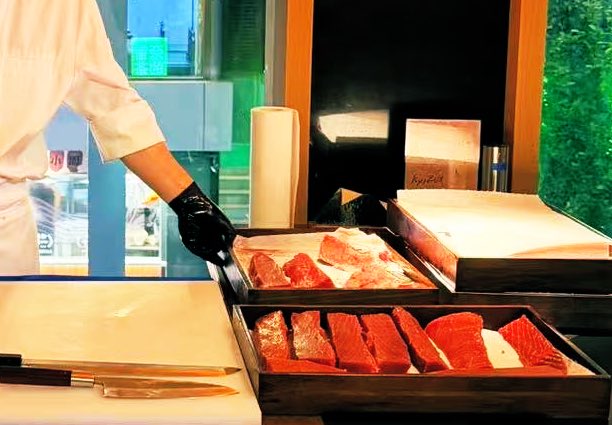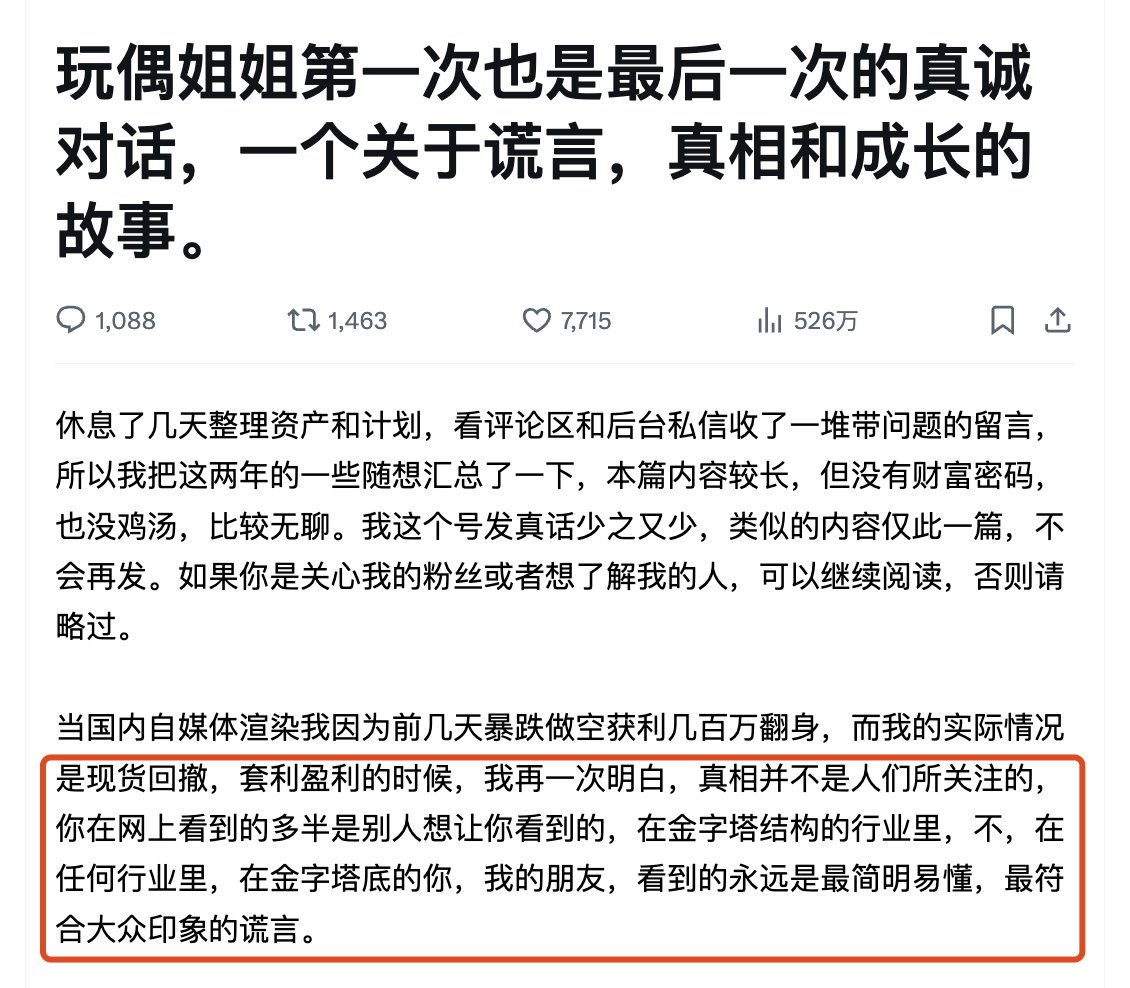From Illusion to Growth: Sister Doll's Truth, the Speculation Cycle, and Self-Evolution!
Sister Doll @MyHongKongDoll's article:
I highly recommend it to everyone working in the internet, crypto, or even the creative industry.
While many may disagree with this article,
I firmly believe that good things, things deep within human nature, should be learned.
I call this article:
An extremely rare "Notes from a Sober Person"—
It talks about the truth, illusions, and growth, and also about how she reclaimed her narrative in a world rife with speculation and lies.
In this article,
the three sentences that impressed me the most are:
The masses have never yearned for the truth;
True growth is learning to navigate the gap between "rationality and wildness," being able to use reason to restrain greed and greed to awaken ambition;
Each of us must pursue long-term self-evolution.
1️⃣The masses have never yearned for the truth!
Sister Doll perfectly illustrates the saying, "Public impression is always the simplest lie," and the underlying logic of the traffic economy is "creating understandable illusions."
If you understand this, you'll know how to become a KOL who grabs attention and quickly gains traffic.
Years ago, I wrote a long article in which I wrote this passage:
The masses have never longed for truth. Faced with evidence that doesn't suit their taste, they will turn their backs on it. If fallacies appeal to them, they are even more willing to worship them.
How true! Anyone who can provide them with illusions easily becomes their master; anyone who shatters their illusions becomes their victim.
2️⃣True growth lies in finding balance in the cycle of "speculation-investment-re-speculation."
I think this is Sister Doll's most valuable insight:
Speculation → investment → re-speculation → ultimate success—this is the typical mental evolutionary path of investors, and most people need to go through this process!
1) Behavioral Level: From Impulsiveness to Rationality, and Then to Integration
Speculation Stage: Driven by intuition, emotion, and FOMO.
Initial "speculation" is often driven by greed and fantasy. People chase quick money, seek shortcuts, and hope to change their destiny with a single, explosive profit.
At this point, the core of behavior is "short-term profit," not "accumulation of knowledge."
Investment Stage: Logic begins to be applied, a long-term perspective is sought, and a focus on structure is emphasized.
After experiencing losses and disillusionment, people return to rationality—understanding the importance of asset allocation, position management, and time compounding.
The focus now is on "long-term growth" and "systematic thinking."
Re-speculation Stage: Risk-taking is revived above rationality.
Mature speculation is not blind, but calculated risk-taking governed by knowledge and discipline.
You understand the risks and the odds, and know when to be aggressive and when to hold back.
At this point, "speculation" is no longer a gamble, but a strategy.
True growth lies in being able to switch effortlessly between rationality and risk-taking.
You neither miss out on cyclical dividends nor give in to greed.
Finally, the rational stage: the awe that comes after experiencing a black swan!
Many people become complacent after achieving some results, but then are educated by the market, by LUNA and FTX, by March 12th, and by October 11th, to understand the true meaning of a black swan. Only through painful reflection or a period of darkness can one achieve rebirth and enter true rationality.
2) Cognitive Level: The Coexistence of Certainty and Uncertainty
Many people think they've "matured" after transitioning from "speculation" to "investment."
In reality, they've simply gone from one extreme to the other.
The key to growth is understanding:
The essence of the market is uncertainty.
Investing and speculation are not opposites, but rather different ways of playing the game in the time dimension.
Investing puts you on the side of time;
Speculation allows you to seize fleeting fluctuations.
The former cultivates "patience and system," while the latter cultivates "responsiveness and courage."
The combination of the two constitutes a complete market survivor.
3) Philosophical Level: The Relationship Between People and the Market:
The cycle of "speculation-investment-re-speculation" is actually a practice of balancing control and letting go.
Speculation means "I can control my destiny";
Investment means "I accept the will of time";
Re-speculation means "I understand fate, yet I still dare to bet."
This reflects not only financial wisdom but also the maturity of life's mindset:
You no longer fear volatility or cling to safety.
Instead, you understand that volatility itself is the price of growth, and risk itself is the source of return.
True growth isn't a one-way evolution from speculation to investment.
It's about learning to navigate the gap between "rationality" and "wildness" after completing a cycle.
Using reason to restrain greed and using greed to awaken ambition.
3️⃣ Pursue long-term self-evolution.
Investing is a lifelong learning process.
This is the rule I currently follow!
Many people live in a state of "goal anxiety"—making enough money, reaching a certain position, achieving so-called "landing." But truly mature people realize that the end of each stage becomes the starting point for the next.
Self-evolution means no longer being enslaved by "results" but instead embracing "growth itself." Instead of asking, "When will I succeed?", you ask: Am I more lucid today than yesterday? Am I more mature in my response to challenges? Have I gathered more intelligent people and friends around me?
This long-term mindset allows you to escape the illusion of cyclicality and enter a life of compound interest.
Self-evolution isn't simply about accumulating knowledge; it involves constantly overturning your existing cognitive models.
It involves two steps:
1) Breaking: daring to admit, "I was wrong" or "I was too superficial."
2) Building: Building on the ruins to a higher level of understanding.
For example, the cycle from chasing huge profits to understanding risks to accepting volatility to coping with uncertainty is a cycle of "breaking—building—breaking again—building again." Those who can navigate this cycle repeatedly are truly evolving.
You have to keep trying → review → adjust → try againThis is just like training a model: every error is a parameter update.
So my final point is:
Evolution isn't just about improving efficiency and cognition; it's also about a deeper understanding and integration of oneself.
When you accept your limitations, shadows, laziness, and desires, and stop rushing to fix everything, but instead learn to move forward with your flaws, you've truly evolved.
As Jung said, "Man is not made whole by imagining light, but matures by facing darkness."
After reading her content, I thought of my own darkest moments and conversations with myself. I was reminded of Haruki Murakami's "The Wind-Up Bird Chronicle," where Toru Okada descends into a well and stares into the darkness: "The real enemy of man is within himself."
Everyone has a well in their life—do you dare to descend and see what truly fears you?
The cry of that strange bird isn't a sign, but a reminder:
The world is moving, and you're stuck.
Thanks again to @MyHongKongDoll for your honesty and inspiration.
The power of "daring to expose" and "being honest" is inherently more valuable than any secret to wealth.
Because true growth isn't about having more resources, traffic, or chips,
but rather—
seeing the truth amidst illusions,
finding order amidst speculation.







